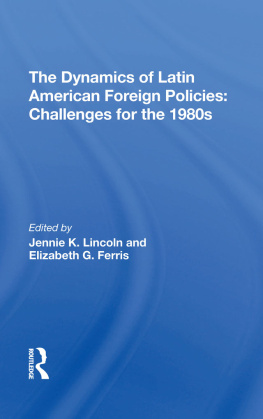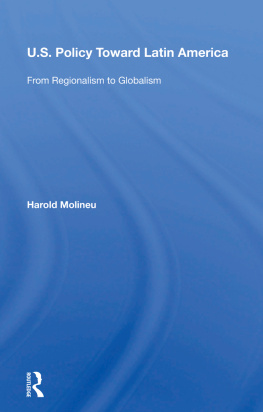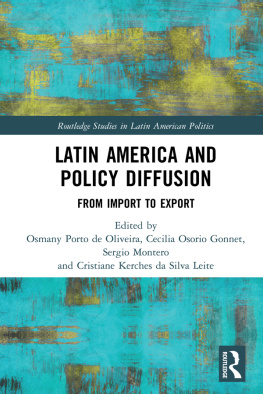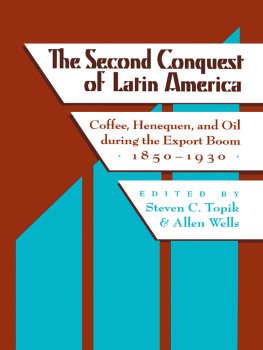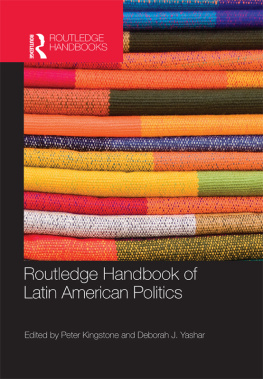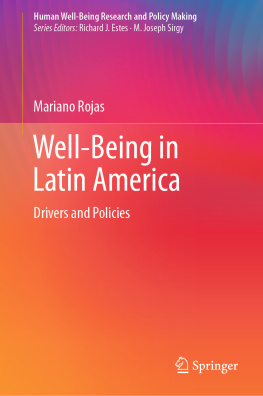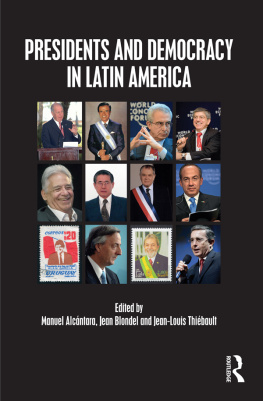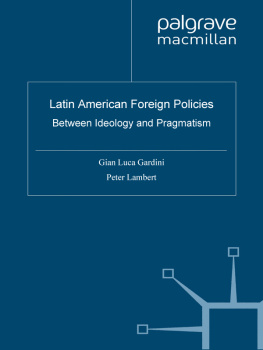Politics and Public Policy in Latin America
ALSO OF INTEREST
Revolution and Counterrevolution in Central America and the Caribbean, edited by Donald E. Schulz and Douglas H. Graham
Revolutionary Cuba: The Challenge of Economic Growth with Equity, Claes Brundenius
Politics and Economics of External Debt Crisis: The Latin American Experience, edited by Miguel S. Wionczek
Latin American Nations in World Politics, edited by Heraldo Munoz and Joseph S. Tulchin
The Exclusive Economic Zone: A Latin American Perspective, edited by Francisco Orrego Vicuna
The Third World Coalition in International Politics, Second, Updated Edition, Robert A. Mortimer
Mexico's Energy Resources: Toward a Policy of Diversification, edited by Miguel S. Wionczek and Ragaei El Mallakh
Mexico's Dilemma: The Political Origins of Economic Crisis, Roberto Newell G. and Luis Rubio F.
Political Change in Central America: Internal and External Dimensions, edited by Wolf Grabendorff, Heinrich-W. Krumwiede, and Jrg Todt
Latin America, Its Problems and Its Promise: A Multidisciplinary Introduction, edited by Jan Knippers Black
Development and Crisis in Brazil, 1930-1983, Luiz Bresser Pereira
The State and Underdevelopment in Spanish America: The Political Roots of Dependency in Peru and Argentina, Douglas Friedman
Revolution in El Salvador: Origins and Evolution, 2nd ed., Tommie Sue Montgomery
PROFILES/NATIONS OF CONTEMPORARY LATIN AMERICA
Cuba: Dilemmas of a Revolution, Juan del Aguila
Honduras: Caudillo Politics and Military Rulers, James A. Morris
Colombia: Portrait of Unity and Diversity, Harvey F. Kline
Mexico: Paradoxes of Stability and Change, Daniel Levy and Gabriel Szkely
Nicaragua: The Land of Sandino, 2nd ed., Thomas W. Walker
The Dominican Republic: A Caribbean Crucible, Howard J. Wiarda and Michael J. Kryzanek
Available in hardcover and paperback.
About the Book and Authors
POLITICS AND PUBLIC POLICY IN LATIN AMERICA
Steven W. Hughes and Kenneth J. Mijeski
This innovative textbook focuses on the policy approach as a systematic tool for understanding Latin American political life and then outlines policymaking variations among the Latin American regimes.
The authors introduce the student to the study of policymaking by examining various theoretical perspectives and then grounding those perspectives in the practice of Latin American politics. Rather than endorse one approach over another, they encourage students to critically examine the methods of making policy.
The book then discusses the main groups and institutions involved in Latin American politics and shows how those institutions interact in the policy process. The text offers penetrating case studies of policy formation in six countries that represent three types of regimes. The final chapters consider the impact of policy. The authors assess the principal tendencies of economic, social, political, and civil rights policies and challenge the student to consider whether these policies have had an impact on the social systems of the six countries analyzed. These chapters point out the utility, as well as the limits, of the policy approach as a means of understanding Latin American politics.
STEVEN W. HUGHES is a professor in the Department of Politics and Public Administration at California State College, Stanislaus, KENNETH J. MIJESKI is an associate professor of political science at East Tennessee State University. They are the coauthors of Legislative-Executive Policy-Making: The Cases of Chile and Costa Rica (1973).
Politics and Public Policy in Latin America
Steven W. Hughes
&
Kenneth J. Mijeski
With Case Studies by Stephen G. Bunker, Juan M. Del Aguila, Merilee S. Grindle, John D. Martz, Cynthia McClintock, & Mark B. Rosenberg
To
Kris, Lisa, Jonathan, Kendra, Keith, and Kara
First published 1984 by Westview Press, Inc.
Published 2019 by Routledge
52 Vanderbilt Avenue, New York, NY 10017
2 Park Square, Milton Park, Abingdon, Oxon OX14 4RN
Routledge is an imprint of the Taylor & Francis Group, an informa business
Copyright 1984 Taylor & Francis
All rights reserved. No part of this book may be reprinted or reproduced or utilised in any form or by any electronic, mechanical, or other means, now known or hereafter invented, including photocopying and recording, or in any information storage or retrieval system, without permission in writing from the publishers.
Notice:
Product or corporate names may be trademarks or registered trademarks, and are used only for identification and explanation without intent to infringe.
Library of Congress Cataloging in Publication Data
Hughes, Steven W.
Politics and public policy in Latin America.
Bibliography: p.
Includes index.
1. Latin AmericaPolitics and government1948
2. Political planningLatin America. 3. Policy sciences.
I. Mijeski, Kenneth J. II. Title.
JL960.H83 1984 320.98 84-11835
ISBN 13: 978-0-367-28365-0 (hbk)
Searching for the appropriate textbook for a course in Latin American politics preoccupies scholars often as much as the search for the appropriate theoretical perspective through which one can gain an understanding of the political life of that region. As students of Latin American politics, we have seen various textbook trends come and go and, sometimes, return again in new forms: texts that focus on the pathological state of democracy in various Latin American countries; those that urge the student to perceive Latin America's options as either reform or revolution, development or decay, dependence or independence, socialist or capitalist; still others that, eschewing theoretical alternatives, offer the student the option of learning about Latin American politics via either a "country-by-country" approach or a more general approach to the common experiences, problems, and possibilities of Latin America "as a whole."
What we offer in this book is not "the" answer to these intellectual and pedagogical dilemmas. Instead, we more humbly suggest that many of the perspectives expressed by other observers of Latin American politics might usefully be considered by focusing on a characteristic common to all political systems and their governments: the effort to formulate, promulgate, and implement public policy. If politics and political actors make a difference in Latin American countries, it should somehow be reflected in the process by which policies are made, the substance of those policies, and their impact.
To examine the public policymaking process in all the Latin American republics would, of course, be a task of monumental proportions. We have not sought such an undertaking. Instead, we suggest (tentatively) that it is helpful to think of many of the Latin American nations as belonging to one of three categories based on government structure and the nature of the policy process: democratic, military, or postrevolutionary. For each of these three categories, we have selected two countries that we believe represent interesting variations of the general type. Venezuela is a democracy of quite recent vintage and also one blessed with valuable natural resources. Costa Rica is a somewhat older democracy (though not greatly so) and one not so well endowed; moreover, Costa Rica is tiny, both in land mass and population, and for all practical purposes an agricultural society, while Venezuela is substantially larger and more industrialized.




